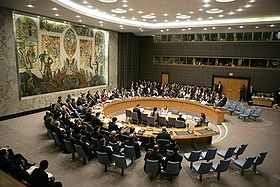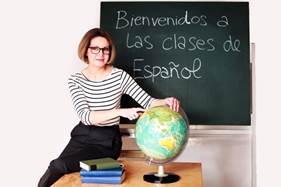
Elly's Blog
Age: 20
University: Bangor University
Studying/Course: German with Spanish
Languages: German and Spanish
Elly's posts are shown below. Click one to read it...
Technology to the rescue!
Social media and the technology behind it have made huge changes to the lives of not just those living far away from home, but everyone across the globe. Social media lets you keep in touch with others and stay on top of events all over the world. For the last five months I have been living in Santiago de Compostela, the capital city of the Spanish region of Galicia. Through living in Spain, I've had experience of technology and social media in the context of a completely different culture. For the main part, I found that the way the Spanish people use these technologies is very similar to back home in the UK, but there are also a few noticeable differences in the use of technology and social media in daily life. For example, the social media platform Facebook is just as popular in Spain as it is in the UK. The majority of Spanish people use Facebook as a means of keeping touch with their friends and family and seeing what they're up to. People in Spain do use Twitter and other social networks such as the photo sharing site Instagram, but I found them to be less popular as in the UK.
In this day and age, it has become commonplace to send a message and expect it to be received instantaneously. As a result of this change in how we use technology, there is a wide range of apps available, through which you can chat, share images and even make calls through WiFi to contacts. Whereas Facebook messenger and iMessage are the most used platforms for sending messages in the UK, Whatsapp is the most popular in Spain. In my experience, every student has the Whatsapp app and people prefer to contact each other via message or phone call through the app. Since Whatsapp isn't as popular in the UK as in Spain, I didn't arrive to the country with the app installed. Trying to explain to my new Spanish friends that I didn't actually have Whatsapp was quite a struggle and they couldn't conceive of someone not being reachable through the app! On the subject of instant messaging apps, one thing that I found quite strange when I first moved to Spain was the way in which Spanish people used apps like Whatsapp and Messenger. The chosen form of message in Spain, it would appear, is the voice message. The ability to send 'voice messages' is something which we do have in the UK, but it is rather unusual to have whole conversations online made up only of voice clips. In Spain, however, this appears to be relatively normal and I have actually become accustomed to speaking to my friends in clips rather than typing a message out. If you haven't already, give your thumbs a break and try it – it's actually much easier!
Another form of technology which I use a lot whilst I'm living abroad is the video-call application, Skype. Skype is just as used and loved in Spain as it is in the UK. I have relied on Skype a lot throughout my travels to keep me in touch with my friends and family back in England. I find this form of free communication amazingly useful as it revolutionises the idea of a year abroad. Unlike in our parents' days, we can live half way around the world and see our families whenever we want. I find it incredibly helpful that I can call my mum over Skype or even over Facebook Messenger and have a chat if I am feeling homesick, or that I can talk to my other friends on their own year abroad travels and find out what they're getting up to. Speaking to my Spanish friends, I've learned that they use Skype just as much as we do in the UK when we want to catch up with people too far away to otherwise see. I do feel as though being able to use technology such as Skype and messenger has made my year abroad experience so much better, as I don't have to worry about feeling too far away from home when my family are just the click of a button away!
Aside from social media, the general level of technology in Spain is relatively the same as in the UK. I am by no means living in the dark ages when I am over here, but there are some slight differences that I have noticed between technology in the UK and technology in Spain. For example, whenever I went to pay for things by card in a shop, the cashier would always ask me 'es de PIN?' (does it use PIN?). At first I found this so strange, as in the UK every card requires a PIN, but it turned out that the PIN technology of having a 'secret number' is quite new to Spain and was only introduced about two years ago. I found this surprising since the UK has had PIN technology for almost a decade and has now moved on toward contactless payments – something which I have never been able to do in Spain. Because of these more modern methods of payment being relatively new to Spain, not all bars and restaurants choose to offer card payment methods. I have had a few issues with being stranded in cafés and restaurants which are cash only, when I only have my debit card with me! At first, this would annoy me, but I learned to always carry some cash on me just in case and I've not had a similar experience for a while!
I hope you've enjoyed reading my first blog post on social media and technology in Spain. Stay tuned for my next blog post on entertainment and leisure on the Peninsula!
Entertainment and leisure
Hi everyone, thank you for checking back in on my Year Abroad! My second blog post is all about entertainment and leisure in Santiago and how Erasmus students and local people choose to spend their free time in the city.
During my time here in Santiago, I have become very accustomed to spending my free time lounging in cafés with my friends. I know I am not alone in this pastime and that having a relaxed coffee with friends is actually a very popular way to spend free-time here in Spain. It may seem very different to the grab-and-go pace of a typical trip to Starbucks in the UK, but it is something I have grown to appreciate massively. What myself and many of my friends also enjoy is the cost of these chilled-out coffee breaks. Over here, you can grab a coffee for the equivalent of about £1 and they even bring you a free tapa too (something which I believe is quite special about Galicia!). Tapas can be anything from a small piece of cake to a slice of traditional Spanish tortilla but whatever they bring you, it is almost invariable delicious and is siempre free!
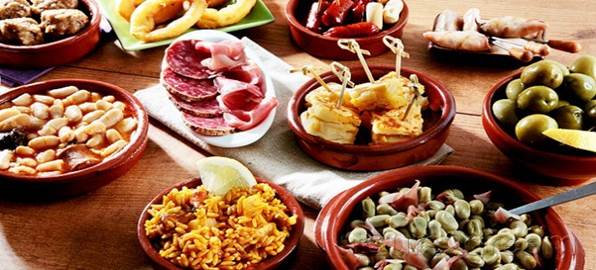
Aside from lounging around in cafés, there are many other leisure activities which Galicia has to offer. One popular thing to do is visit Santiago's local monuments such as La Catedral de Santiago de Compostela, which is the famous finishing line for the Camino de Santiago, during which thousands of pilgrims trek from France to Spain in order to see the monument of Saint James (Santiago in an old form of Spanish) which is situated within the cathedral. The cathedral really is stunning and it is a fantastic experience to be able to see such a famous sight in real life. Other than the cathedral, another landmark within Santiago is the Parque Alameda, a protected park which boasts amazing views over Santiago and offers its visitors a relaxing walk in nature. Whenever I was bored or just felt I needed to get out of the house, I would go for a walk around the Parque Alameda and it never failed to put a smile on my face! Whether it be on a guided tour or a solo-trip, seeing these sights is a must for entertainment in Santiago de Compostela!
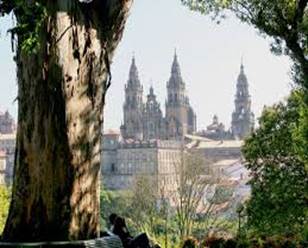
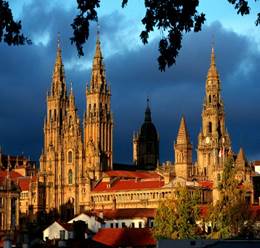
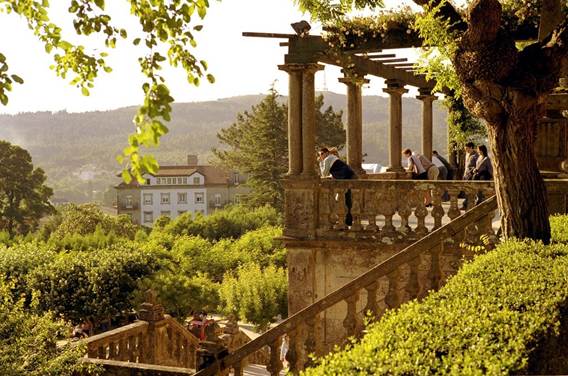
If you're into dancing, Spain is definitely the place to be. Within Santiago, there are numerous dance classes which claim to teach you the classics and give you a taste of the Spanish culture. If you feel like dancing, you can take up salsa, flamenco or even reggaeton dance classes. Although I never participated in any of these classes (I have two left feet!), I have friends who went and had the time of their lives and can now even hold their own on the dancefloor.
Of course, as with any city, there are the more 'typical' pastimes as well as the more extraordinary. For instance, shopping is just as loved a pastime for the people of Spain as it is in the UK. Even if the shops may be a bit different to those which we're used to in the UK, it doesn't make retail therapy any less effective! Even more popular than shopping is a trip to the cinema. The cinemas offer films in both Spanish and English and even have deals on certain days which can grant you entry to see a film for as little as 3 euros (about £2.50!). I went to see a couple of films in Spanish and found it so helpful for practicing my listening skills and was even surprised how easily immersed I was into the film despite the language not being my mother tongue!

Without a doubt, my favourite form of entertainment during my time in Spain was to take day-trips to nearby places of interest. The first city I visited after moving to Santiago was A Coruna, the former capital of Galicia. A Coruna was much bigger than Santiago, with less pretty architecture but it had beautiful beaches and restaurants which backed onto the sand for a sunny day! A Coruna was a fun day-trip but definitely not my favourite of all the places which I visited. My favourite day out was organised by the Erasmus Student Network in Santiago. We started the day by heading out to a stunning former monastery in the Galician Mountains. The monastery was shrouded in low-lying mist and really was a sight to be seen.
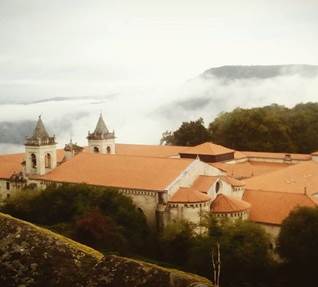
After touring the monastery, we headed to visit a famous vineyard in the Rias Baixas region where we tasted Galicia's famous Albariño wine. The views of the vineyard were incredible! After winetasting we moved on to the best part of the day (in my opinion!), which was our visit to the termas of Ourense. In Spanish, a 'terma' is a thermal spa, a pool of water which is naturally heated by hot springs underground. These pools are said to have special healing properties and a used regularly by local residents as a method of maintaining good health and a relaxed mind. There are a few termas across the region of Galicia and I am led to believe that they are quite a popular form of relaxation and leisure for nearby residents. Below is a picture of the termas as seen from a nearby brigde.
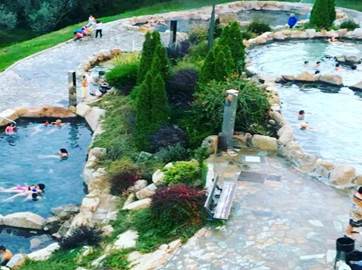
So that completes this blog post on entertainment and leisure in Galicia/Spain and what I have experienced whilst living in this country. Thank you very much for reading and I hope that you have enjoyed it and maybe taken some tips on how to spend your free time, should you go on to have a Year Abroad like me!
Elly J
The Environment – Germany vs the UK
I'm currently studying in Berlin, Germany and this blog is going to be dedicated to the differences in approach to protecting the environment in Germany and in Wales. The environment is such a hot topic nowadays that it's quite hard not to be aware of what we're doing in our daily lives to help or to hinder the planet. Recycling, of course, is a concept in both countries. I think that most developed countries now have some sort of recycling-scheme - which I must say I am very happy about – but of course no two approaches to recycling are necessarily the same. I remember from living in Gwynedd that the recycling laws were quite strict. We had to sort our plastic, paper and glass into separate crates, throw garden waste in one pin, put general waste in a certain bin and even throw our food waste in a separate bin. At the time, this was quite the annoyance to me and my housemates as we would regularly forget and end up spending Monday night frantically sorting rubbish before the bins were taken out on Tuesday morning! That being said, I do believe that recycling is a good habit which we should all have (just don't forget to sort your paper from your plastic!).
For the most part, the recycling system is the same here in Germany. I live in a Wohngemeinschaft here in Berlin, which means it's sort of like halls of residence in the UK except with fewer people sharing each flat. Because we don't live in a 'normal' house, we don't have our own bins for the bin men to empty. We have huge communal dustbins at the front of the property, in which we need to throw our waste once our flats' bins are full. There is one bin for recycling plastic/paper/glass, which regularly gets over-full, meaning that sometimes your recycling ends up being thrown in one of the many general waste bins. This is obviously less than ideal, but there are at least facilities for most of the recyclable waste to be thrown.
One main difference which I have noticed here in Berlin compared to UK cities is the prevalence of public transport. The saturation of public transport (Öffentlichen Verkehrsmittel) in Berlin is high. Busses, trams, trains and underground trains run every couple of minutes during the day every day and even run through the night on weekends! Because of this, so many people have little need for cars to commute into the city and those of us who live within the city limits have no real need to drive and deal with traffic when public transport is so frequent. Since the transport runs 24-hours on weekends, the need for taxis is much less, thus meaning that there are even fewer cars on the road (fewer harmful emissions!). Don't misunderstand, the city isn't empty of cars, but there is nowhere near as much traffic as you would see in places such as London.
My favourite recycling scheme which I have come across in Germany is the Pfand system. A Pfand is a deposit which you pay on any glass or plastic bottle bought in shops in Germany. The deposit normally costs between 15 and 25 cents, depending on the size of the bottle, and can be redeemed at a Pfandautomat in supermarkets or shopping centres. The machines require you to scan the barcode on the bottles which you are returning and will then either repay you in coins or give you a receipt for the amount owed which you can use as a discount on your shopping. Even though you are not really earning any more money, just reclaiming already spent money, the Pfand system makes you feel as though you are profiting from recycling. Think about it – if you could claim back 25p of your own money for every bottle of Coke or Sprite which you drink, wouldn't you feel more inclined to save it and return it rather than just throw it in the nearest bin? I know that I do! I know that many people believe that the UK should implement a deposit system for recycling – what do you all think? Would you be happy to pay the extra money knowing that you could claim it back once you had finished your drink?
I hope you've all learned something about approaches to environmental issues in Germany and how they may differ to how we do it in Wales! Maybe it's food for thought on how the UK could do things differently in the future!
Until my next blog post,

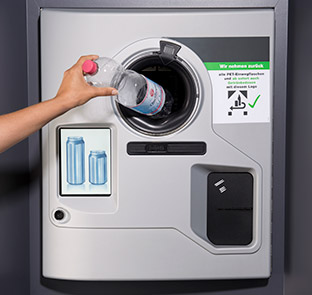
Elly J
Travel and Transport in Spain
Hi everyone, welcome to my third year-abroad blog post! In this blog post I'll be explaining travel and transport in Spain and the experiences which I had whilst living in Santiago de Compostela.
So to start, I'll talk about the mode of transport which I used the most whilst living abroad, and one which many of you reading my use every day at home: the bus. Let's be honest, Spain isn't vastly different to the UK – they have busses just like us and they function in pretty much the same way. You hop on, buy your ticket from the miserable driver and then hop off when you're at your stop. The one thing I did find different, though, was the price! Taking the bus in my region of Spain was so much more affordable than at home. For a regular citizen, it costs 1 euro per journey (90p) and 10 cents (9p) for a student at the university! Apart from walking on foot, I found that taking the bus was definitely the most popular mode of transport in Santiago de Compostela. When it came to visiting places outside of the city, taking the bus was often also a much cheaper option. There was a bus which would drive from Santiago to Porto in Portugal, which only cost about £35 return! I know a few people who took advantage of that offer to have a cheap weekend away in Portugal ;-)
Aside from taking the bus to neighbouring cities (or even countries), taking the train was also a viable option. I took the train from Santiago de Compostela to A Coruna in northernmost Galicia and it allowed me to see sights that I may not otherwise have been able to see. The train took a route which roads didn't, and the views of mountains and vineyards was breath-taking. If any of you ever visit Galicia, I recommend you trying to see some of these views from the comfort of the train! And
as a side note, their trains were much more modern and comfy than ours in the UK – definitely more Virgin than Arriva Trains Cymru! Since taking the bus in and around Santiago was so cheap and so popular, calling a cab wasn't very common. I think I only ever got taxis between my flat and the airport and that was only because I had too much luggage to carry to the airport bus! It wasn't that common to see taxis driving around by day but more common at night when busses were no longer running. I believe Santiago was too small to warrant always taking a taxi since you could walk across the city in about 40 minutes, but I know that they are just as popular (and pricey) in big Spanish cities as they are in the UK.
The mode of transport which I used the least frequently in Spain was the plane. Although it wasn't something I did every day, taking planes is something I got used to very quickly as part of my year abroad. Between September 2016 and March 2017, I took 17 planes! Flying in Spain is very similar to flying within the UK and Ryanair is currently dominating cheap flights over there too. During my time in Santiago, I took flights to Valencia, Seville, Madrid and Barcelona. Whilst those flights were direct and quite quick, flights to less major cities were awkward to find out of Santiago. Since it is only a small airport, it is not very well connected and I found myself often having to take multiple flights to reach my end destination. Since I was living in Galicia, a less than well-connected area of the country, it would always take me two (sometimes even three) flights to get between my Erasmus placement and my hometown in northern England. Because of this, I actually didn't go home for four months, which was definitely a challenge! However, I feel like it helped me settle and really take the opportunity at hand in Spain, so maybe it was for the best in the end J Flying in Spain was probably my least favourite way of travelling the country, but once I got past the lack of direct flights, I had a great time on my travels! Being able to fly internally in Spain allowed me to visit other friends on Erasmus placements, explore new cities and generally enhance an already brilliant opportunity abroad!
I hope that this blog post has taught you something about the way transport in Spain works and the ways in which one can travel in Spain. Overall, I would say that the cost of travel in Spain is what is most different than at home in the UK, as everything is so much cheaper in comparison! Thank you all for reading and until my next post,
Elly J

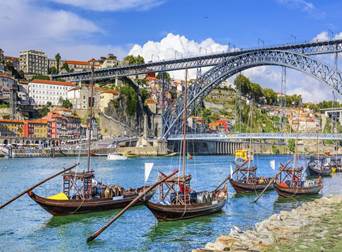
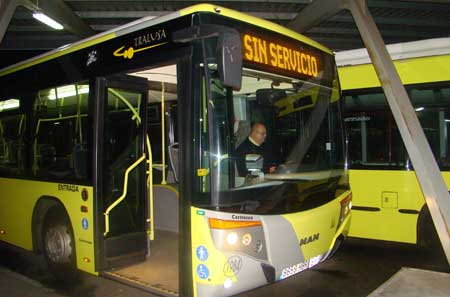
Last post of the year!
Hi everyone!
Welcome to the final blog of my year abroad! As you may know, once I return to Bangor, I only have one more year of university before I graduate! As a way of rounding off my experience abroad, I am going to dedicate this post to my future as an MFL graduate and explain a little bit about career paths that MFL graduates can take. After I graduate, I want to study the GDL. The GDL stands for the Graduate Diploma in Law, otherwise known as 'the Law Conversion Course'. This course allows non-Law graduates to qualify in Law after they graduate from any other degree. So, in my case, I'll graduate from Bangor and do a one year GDL in order to eventually qualify as a solicitor. It is quite common for MFL graduates to go on and do further studies in areas such as Law because of the transferable or 'soft' skills our degree teaches us. A degree in Languages teaches you vital communication skills. Students learn how to present and how to speak publicly as well as how to express thoughts and concepts in a foreign language. Employers LOVE this, because if you can do all of that in a foreign language, just imagine how capable you'd be in your native language.
An obvious route for languages students is to go into a career in which you'll actively use your language(s). I have many friends who plan on completing a PGCE after university in order to qualify as a Languages teacher. I also know some people who aim to go into interpretation or translation. Interpretation is the spoken translation of languages, whereas translation is written. These two fields are very relevant on the international platform as every government needs documents translating between languages or for an interpreter to intermediate conversations between diplomats or figureheads who may not speak a common language. Further to this, city councils, organisations such as the EU and the UN and international businesses also require multilingual individuals to facilitate their operations.
I know that most of you reading this may not have a set career goal right now and that is perfectly normal. Some of you may have an idea of the kind of work you would like to do but are not certain and some may even know without a shadow of a doubt what your future line of work will be. To those of you who do, I salute you – I know I definitely wasn't sure at your age! But I have a message that I would like you all to consider. Regardless of what you think you would like to do, at least consider continuing with studying a language. The UK is one of the most mono-lingual countries on the planet, meaning we have a huge shortage of bi- and multilingual workers in our job market. Graduates who are able to communicate in a language other than English are automatically more appealing to recruiters than their monolingual peers, regardless of the job they are applying for. Since languages are non-vocational (meaning they don't lead to a certain line of work, unlike Medicine or Veterinary Science), they complement pretty much any career perfectly. By pursuing a language, you are never narrowing your options, only ever widening them. An individual who speaks English and studies Journalism would be able to be a Journalist in England, the US, Canada or Australia. Whereas, an individual who studies Journalism and speaks English and German would be able to be a Journalist in all of the aforementioned countries PLUS Germany, Austria, Luxembourg, Belgium and Lichtenstein (not even counting countries which have a large German-speaking population but do not speak the language natively!). By learning a language, you open yourself up to multiple new job markets and therefore so many more job opportunities!
I think it's clear at this point that I am a huge advocate for studying a foreign language. That being said, I want you to all go on to study something that genuinely interests you. If learning a language appeals to you then that is brilliant, as we have seen in this blog post! However, if you want to become an Astrophysicist or a Fireman, then pursue that and be the BEST you can be in whichever field you work in.
It has been a genuine pleasure to have written these blog posts over the last seven months. I hope you have all enjoyed learning about my year abroad and that maybe some of you have discovered a new interest in continuing to study a modern foreign language! I wish you all the best of luck with the rest of your studies, whatever you may pick!
Elly J
